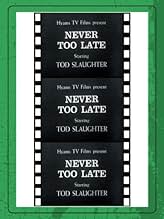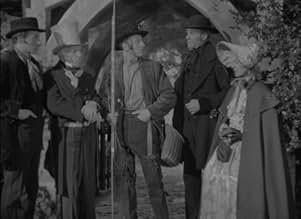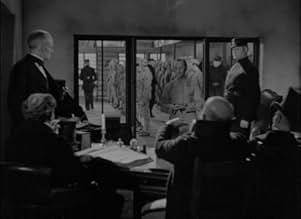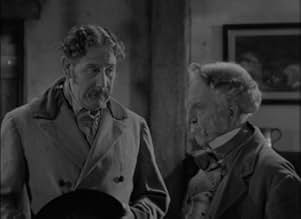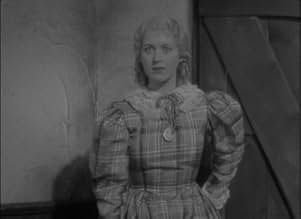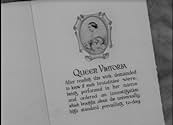Ajouter une intrigue dans votre langueAn evil prison administrator cruelly abuses the inmates at his prison, until one day the tables are turned.An evil prison administrator cruelly abuses the inmates at his prison, until one day the tables are turned.An evil prison administrator cruelly abuses the inmates at his prison, until one day the tables are turned.
John Singer
- Matthew Josephs
- (as Johnny Singer)
Cecil Bevan
- Prison Inspector
- (uncredited)
Leonard Sharp
- Henry Bradshaw
- (uncredited)
Douglas Stewart
- Prison Inspector
- (uncredited)
Mavis Villiers
- Betty
- (uncredited)
Jack Vyvyan
- Innkeeper
- (uncredited)
Avis en vedette
ITS NEVER TO LATE TO MEND is the most traditional of Tod's revived melodramas. It has all the elements and archetypes we expect from the genre. Tod is his usual villainous Squire self. His often comical facial features are better suited to being bewhiskered and having a bushy moustache to twiddle menacingly. As ever, he has his lecherous eye on a virtuous local maiden - Susan, daughter of Farmer Merton. She seeks the penurious local tenant farmer George Fielding (Meadows, Fielding, a slimy solicitor who aid's Tod's schemes called Crawley - the names are not exactly subtle). Tod must be the only wealthy bastard in cinema who never attracts women! But after a failed attempt to convict George for poaching, the young man leaves the country to seek his fortune Down Under. The opening titles reveal Charles Reade's and Queen Victoria's roles in prison reform and it is in the scenes where Tod visits the local gaol in his capacity of Justice of the Peace that we get to enjoy the full magnitude of his hammy villainy. His inspection of the ranks of his "naughty children" and his mocking remarks are a sadistic joy and one can imagine the audience at the Elephant and Castle theatre chuckling along as he speaks. Black comedy is also present in the Uriah Heep-like performance of one convict who makes a great show of demonstrating his penitence but, we see later, has stolen something from the Governor's office. However, the treatment of the 15-year old convict is genuinely disturbing as is John Singer's anguished breakdown.
The tension is diffused by the lack of a strong protagonist for the Squire. George Fielding is sidelined in Australia for the bulk of the narrative - returning only for the climax. The Prison Chaplain provides only token resistance to Tod's reign of terror at the gaol but appears like the 7th cavalry at the end. The main adversary is local poacher Tom Robinson - gallantly taking the blame instead of George for Tod's trumped-up poaching charge. Tom's decline from the jaunty, confident rogue of the opening scenes to a shell of his former self in prison is quite chilling, but the spiritual comfort the Chaplain lends him means a reversion to his old self.
Tom thwarts Meadows' attempts to steal George's newfound fortune. As with MARIA MARTEN, Tod has an alarming tendency to go insane at the inopportune moments - usually while holding his enemies at gunpoint as occurs here at the climax His raving madness as he is led away is genuinely alarming and the closing shot is of him relentlessly repeating the films's title as he works away on the "wheel".
The tension is diffused by the lack of a strong protagonist for the Squire. George Fielding is sidelined in Australia for the bulk of the narrative - returning only for the climax. The Prison Chaplain provides only token resistance to Tod's reign of terror at the gaol but appears like the 7th cavalry at the end. The main adversary is local poacher Tom Robinson - gallantly taking the blame instead of George for Tod's trumped-up poaching charge. Tom's decline from the jaunty, confident rogue of the opening scenes to a shell of his former self in prison is quite chilling, but the spiritual comfort the Chaplain lends him means a reversion to his old self.
Tom thwarts Meadows' attempts to steal George's newfound fortune. As with MARIA MARTEN, Tod has an alarming tendency to go insane at the inopportune moments - usually while holding his enemies at gunpoint as occurs here at the climax His raving madness as he is led away is genuinely alarming and the closing shot is of him relentlessly repeating the films's title as he works away on the "wheel".
Never Too Late is a typical Tod Slaughter vehicle in some ways but is also certainly the most serious-minded of his films. In it, once again, Slaughter lusts after a woman young enough to be his daughter, while concocting up a dastardly scheme to take her fiancé out of the picture. This kind of specific plot-line underpinned the majority of Slaughter's other Victorian melodramas. Where this one deviates from the norm is that it also incorporates a plot thread that takes a withering look at the prison system in Britain of that time. It shows life in these prisons to be a succession of horrors, with the inmates treated appallingly and the governors acting immorally. It's this social awareness that is a little unusual for a Slaughter melodrama but it does quite effectively make its point about the unpleasantness of the system.
Slaughter himself is once again very much the star draw though, here he plays a character called Squire John Meadows and it's a role that once again allows this great - now pretty obscure – actor to flex his acting chops. His style is the opposite of subtle and is hammy to the max. But it is difficult to play this over-the-top so well and it's a testament to Slaughter's abilities that his fully committed performances are so engaging to watch. In this one, it's perhaps his final moments that stand out the most, where, as he is dragged away by the authorities, he screams insanely at the young woman he has lusted after that her fiancé will leave her! It's a bizarre and manic display and a great way for his unhinged character to bow out of the film. On the whole, this is yet another example of why this great British actor should be rediscovered and reappraised.
Slaughter himself is once again very much the star draw though, here he plays a character called Squire John Meadows and it's a role that once again allows this great - now pretty obscure – actor to flex his acting chops. His style is the opposite of subtle and is hammy to the max. But it is difficult to play this over-the-top so well and it's a testament to Slaughter's abilities that his fully committed performances are so engaging to watch. In this one, it's perhaps his final moments that stand out the most, where, as he is dragged away by the authorities, he screams insanely at the young woman he has lusted after that her fiancé will leave her! It's a bizarre and manic display and a great way for his unhinged character to bow out of the film. On the whole, this is yet another example of why this great British actor should be rediscovered and reappraised.
This is an underrated portrait of the Victorian prison system and the chaplain who tried to change it. An evil squire(Tod Slaughter) sends an innocent man to the British version of Alcatraz in order to get his filthy mitts on a beautiful girl. The cinematography is what makes this film so memorable. The effective use of light and shadow to accentuate the misery and suffering of the inmates, many of which are victims of a corrupt system, foreshadows a style utilized in many venerable products of English postwar cinema such as David Lean's Oliver Twist(1948) Some modern critics have panned this and many other Tod Slaughter films due to the melodramatic, stagey acting. While films like The Demon Barber of Fleet Street(1936) barely hold up today, Never Too Late is the exception because it is well-acted and photographed and is relevant to the global problem of human rights abuses that in these supposedly progressive times has still to be wiped out. After viewing this, I can see why Queen Victoria passed so many prison reform bills after seeing this story done on stage.
Not surprisingly, this is a very good Tod Slaughter film. Much better than I anticipated. Slaughter does not disappoint - nor does the rest of the cast, directing and story.
Slaughter plays Squire John Meadows, a cruel man that is head of the prison (justice of the peace)and provides plenty of creative punishments for the inmates: straight-jackets, near starvation, whips and more. What's worse he's found a way to try to imprison an innocent man in order to pursue the man's lady friend.
Lovely use of shadows as only B&W films can capture, wonderful cinematography, a cruel story, excellent performances by the cast. This is a worthwhile drama - it's no masterpiece but it is good.
8/10
Slaughter plays Squire John Meadows, a cruel man that is head of the prison (justice of the peace)and provides plenty of creative punishments for the inmates: straight-jackets, near starvation, whips and more. What's worse he's found a way to try to imprison an innocent man in order to pursue the man's lady friend.
Lovely use of shadows as only B&W films can capture, wonderful cinematography, a cruel story, excellent performances by the cast. This is a worthwhile drama - it's no masterpiece but it is good.
8/10
Watching Tod Slaughter in all kinds of venues, I've come to the conclusion that he is about as bad as a person can get. He expresses this great delight with misfortune of others. He uses people for financial gain, yet at the beginnings of most of his movies, he is portrayed as being loved and respected by all. In this one, he plays a squire who is after a young woman (sound familiar) thirty years his junior. He plants traps for her true love. He also oversees a prison, being a justice of the peace. The prisoners, whom he calls his "chilldren," are abused and starved. He gleams with those big teeth over the misfortunes of these people. One boy, in particular, stole a loaf of bread to feed his dying mother (of course), and he is tortured and force to do work beyond his simple strength. Others are kept in a black hole. How despicable can you get? Of course, his comeuppance is on its way. Eventually those he has used will get there's. This guy is so great. Even though he played the same character over and over.
Le saviez-vous
- ConnexionsFeatured in Doom Asylum (1988)
Meilleurs choix
Connectez-vous pour évaluer et surveiller les recommandations personnalisées
Détails
- Durée1 heure 10 minutes
- Couleur
- Rapport de forme
- 1.37 : 1
Contribuer à cette page
Suggérer une modification ou ajouter du contenu manquant

Lacune principale
By what name was It's Never Too Late to Mend (1937) officially released in Canada in English?
Répondre
